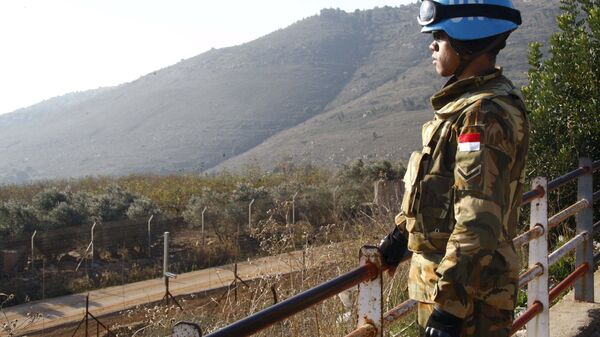Israel has begun preparations for the building of a concrete wall on the so-called blue line — the Israeli-Lebanese border recognized by the UN, according to Lebanese President Michel Aoun; Beirut insists that the line needs to be moved to the south in three places.
"Michel Aoun advocates the observance of international law, on the one hand, and the rights of the Lebanese, on the other hand," Lebanese retired Brig. Gen. Amin Hteyt told Sputnik Arabic. "The blue line is not a border between the states, because it partially lies in the Lebanese territory. If the [separation] wall is built on it Lebanon will lose part of its land in three places."
Particularly for this reason President Aoun opposes the construction of the wall by Tel Aviv.
"When protection becomes a strategic principle, the question arises as to what specific protection tool to choose," Hteyt noted. "The construction of a wall or the use of natural landscape for that purpose is common and popular measures. Israel has chosen to build a wall on the border with Lebanon. We see the shift in Israel's military strategy: from the offensive one to more complex tactics of attack and self-defense."
In response, the Israeli Defense Forces (IDF) launched Operation Litani invading southern Lebanon, which was regarded as the PLO's foothold in the 1970s on March 14, 1978.
The next day, Beirut addressed the United Nations Security Council protesting against the invasion and emphasizing that Lebanon had nothing to do with the PLO's previous attack.
For its part, the UN Security Council issued Resolution 425, which was adopted on March 19, 1978, calling upon Israel "immediately to cease its military action against Lebanese territorial integrity and withdraw forthwith its forces from all Lebanese territory."
In case Israel starts building a security wall along the blue line, regardless of Lebanon's protests, Beirut has at least two options to stop Tel Aviv, retired Brig. Gen. Hteyt stressed.
"First, [Beirut can] apply to the UN to force Israel to stop construction in disputed areas," the retired brigadier general explained. "Lebanon will not object to the construction of the wall where the blue line coincides with the state border. The second option is an armed confrontation. The Lebanese Army and resistance forces will oppose Israeli aggression."
On Monday, during the talks with acting the UN special coordinator for Lebanon, Pernille Dahler Kardel, President Aoun discussed the repeated violations of Lebanese borders by the Israelis and condemned Tel Aviv's unilateral plan to construct the wall between the two states.
The views and opinions expressed by Amin Hteyt are those of the speaker and do not necessarily reflect those of Sputnik.





